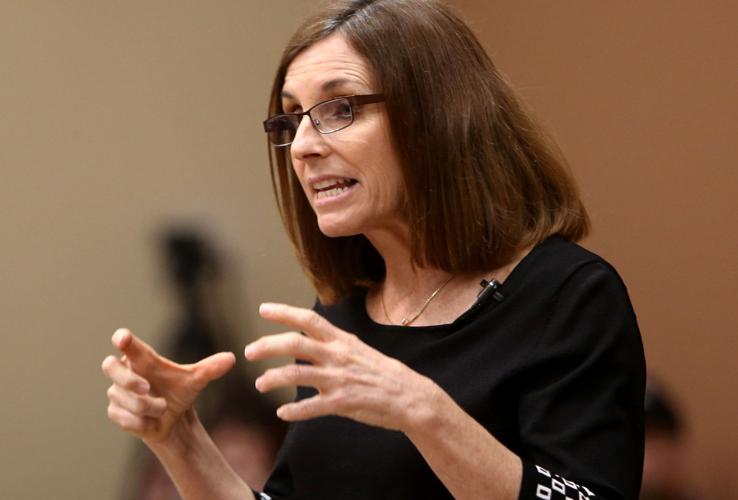‘First, do no harm.”
It’s a medical principle that members of Congress ought to keep in mind when messing with our health-care system.
For Democrats pondering the Republican proposals to replace the Affordable Care Act, the principle is easy to apply. They’ll vote no — if they ever get the chance to vote — because the replacement plan, the American Health Care Act, is worse than what it’s intended to replace. It will lead to millions of people losing insurance without many assured benefits other than an end to the dreaded insurance mandate.
But for Republicans like Tucson’s Rep. Martha McSally, the answer is more complicated.
McSally and many other congressional Republicans ran for election on the idea that — to use the phrase she and others repeated often — “Obamacare is collapsing under its own weight.”
So McSally has taken a tack of trying to fix the problems with the proposed replacements, rather than recognizing that the replacements themselves might be the biggest problem.
In March, she helped negotiate changes to the original replacement bill: Getting an additional $15 billion for mothers, newborns and people with mental illness or substance-abuse problems was one. She also has argued for a longer transition from the old Medicaid subsidies to a new, pared-down system.
Like much of the congressional GOP, McSally has been wedded since last year’s campaigns to the idea of Obamacare collapsing, a phrase suggesting that any replacement would be better than the ultimate failure of Obamacare. Voters seemed to accept this point of view.
But then a funny thing happened. When President Trump was elected and the public was faced with the possible reality of the Affordable Care Act actually being repealed, it became more and more popular. People began to protest, worrying that under the replacement bill, they would again be denied health insurance because of a pre-existing condition or due to impossibly high rates charged in “high-risk pools.”
The idea that insurance companies would no longer be required to cover 10 fundamental services started to worry people.
Just as important, further examination has shown that the Affordable Care Act is not “collapsing under its own weight.” It has major flaws — especially the cost of insurance on the ACA marketplaces for people who are not poor enough to qualify for large subsidies. But it is by far better than any alternative presented so far.
In its assessment of the American Health Care Act, the Congressional Budget office said this: “In CBO and JCT’s (Joint Committee on Taxation’s) assessment, however, the nongroup market would probably be stable in most areas under either current law or the legislation.”
Get that? The insurance market would be stable under either the American Health Care Act or the existing Affordable Care Act, not collapse. The analysis goes on:
“Under current law, most subsidized enrollees purchasing health insurance coverage in the nongroup market are largely insulated from increases in premiums because their out-of-pocket payments for premiums are based on a percentage of their income; the government pays the difference. The subsidies to purchase coverage combined with the penalties paid by uninsured people stemming from the individual mandate are anticipated to cause sufficient demand for insurance by people with low health-care expenditures for the market to be stable.”
Other analyses have found the same thing: There are problems with the private insurance marketplaces that need fixing, but the Medicaid expansion and the overall reduction in the number of uninsured people has been a success.
But this week, the House made another effort at reviving the American Health Care Act, this time with changes that appealed to the more conservative Republicans. When it was revealed that one provision would allow members of Congress to opt out of some changes — protecting themselves from the weakening of standards under the bill — McSally submitted a bill that would remove that provision.
Dr. Daniel Derksen, a professor of health policy at the University of Arizona’s College of Public Health, told me the amended bill is aking to “rearranging the deck chairs on the Titanic.”
“The American Health Care Act would be a catastrophic disaster,” said Derksen, who also heads the UA’s Arizona Center for Rural Health.
Most important, he pointed out, would be the drastic cuts in federal commitments to support state Medicaid programs.
“This would take us back to having 1.2 million uninsured Arizonans,” he said.
“There’s nothing inherently flawed in the design” of the Affordable Care Act, Derksen said. “It’s a matter of how you can improve on it so that insurers will stay in and customers aren’t trying to decide whether they have a provider every year.”
Among the possible improvements: Making it possible for insurance companies and states to agree to participate for longer terms, maybe three years as in other federal programs, so that the year-to-year uncertainty is removed, and doing so across state lines.
So, for all McSally’s work at trying to improve the Obamacare replacement, perhaps the solution is simpler than tinkering around the edges. It’s to do no harm by saying no.





